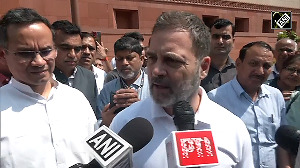There is a predictable farce that is enacted each time a high-profile rape case hits the national consciousness, says C Uday Bhaskar
India, the world's largest democracy, has the dubious distinction of being a nation where a rape against a vulnerable woman or girl is committed every 40 minutes. And national capital Delhi leads this shameful statistic. It is the most unsafe major city when compared to other metros like Mumbai, Kolkata and Chennai.
As per police records compiled from across India, the national rape figure for 2011 is illustrative, wherein Delhi accounted for 572 reported rape cases (that is almost 48 rape cases per month), while Mumbai reported 239 cases, Bangalore had 96 such shameful incidents and Chennai and Kolkata recorded 76 and 47 such incidents respectively.
As is often noted, these are merely the cases that were reported by the victims. It is estimated by social workers and medical professionals that there could well be as many or even more such cases of molestation and sexual intimidation that remain unreported due to the social stigma associated with rape victims.
Yet, in spite of such appalling figures, the gangrape and brutal assault of a 23-year-old girl in Delhi has shamed the county in an unprecedented manner. The victim is still in a critical condition -- the damage to her internal organs is reported to be irreparable.
The details of the assault in a private bus have been documented in gruesome detail and while this is an indictment of the safety index in the city, the civil society in Delhi must also hang its head in shame.
It has been reported that the victims -- the young lady and her friend -- were stripped and pushed out of the bus after being assaulted for over an hour and their naked bodies were lying on the road in Mahipalpur that winter night.
By the time the police arrived, there was a crowd of over 50 bystanders; it has been reported that not one of them had the decency or humanism to even cover the bodies of the hapless victims.
Rape cases litter the country and neither age nor socio-economic status is any bar to prevent the occurrence of such crimes. There have been agonising reports of girls as young as three years old (such a case was reported -- yes, in Delhi again -- on December 17) to grandmothers of over 70 years old being sexually assaulted.
Most such cases go unreported or little attention is paid to them. Even when the police arrest the perpetrators, the prosecution rate is about one in three after years of legal delays and victims being forced to live in fear and shame.
The short and disgraceful summary is that India and its governing elite -- both the political class and the executive represented by the police and the bureaucracy -- remain indifferent to the reality on the ground.
The permissiveness with which rape is perceived is again reflected in the fact that those accused of rape have been allowed to enter the Indian legislature at the state and Centre. A former Bahujan Samaj Party leader and minister from Uttar Pradesh -- Awadhpal Singh Yadav -- is currently facing trial in a rape case involving the domestic help.
There is a predictable farce that is enacted each time a high-profile rape case hits the national consciousness -- more often than not due to commendable media activism.
Protests are held by civil society, women's groups demand the strictest punishment for the perpetrators (in the present case both the death penalty and castration have been mooted), political leaders make ostensibly earnest and strong statements, the local police chief promises swift action, shrill debates are held on TV channels and in about a fortnight, the specific case is gradually forgotten.
The rot, as is often the case, stems from the very top -- both in the state and society. More than 90 percent of rapes occur within the family and neighbourhood. The social orientation of Indian society is anti-girl and anti-woman. While it is true that the laws penalising rape and sexual offences need to be made more stringent, it is the implementation of existing laws that leave a lot to be desired.
If Delhi is taken as an example, it has been said time and again that the state of public transport in the city is abominable and controlled by a mafia that involves the local political class, the bureaucracy and the police.
For instance, the national capital has more than 50,000 auto-rickshaws, which are a law unto themselves. Drivers are not registered, meters do not work and the local administration has neither the inclination nor the ability to regulate their conduct. This incidentally is true of many other cities.
Public transport buses are in short supply and the private chartered buses are controlled by the city's auto-lords with criminal linkages. In the current case, the driver and the conductor appear to be unauthorised and the use of tinted glass windows remains rampant despite regulations to the contrary.
The political spectrum is often culpable for they are seen to be stakeholders in perpetuating such a state of affairs and are only interested in their personal benefit and safety. The Indian legislature has the dubious track record of closing rank and passing legislation when their own interests are involved -- as noted for example when they have to vote themselves an increase in pay and allowances, or to protect their own legislative interests, as in the office-of-profit ordinance.
A statistic pertaining to the conduct of the Indian Parliament is revealing. A study has established that 'In 2010, Parliament recorded its worst performance in the winter session in the last 25 years. By 2011, the record had already been broken.'
More than a quarter of all Bills passed by this august body in 2009 were discussed for less than five minutes! Long overdue police reforms are yet to receive even these five minutes.
This year is coming to an end and the shame that attaches to the world's largest democracy is glaring. A young woman's life is precariously balanced due to the tenacious insensitivity of India at large. And this is the nation with many powerful political woman leaders like Sonia Gandhi, Sushma Swaraj, Mayawati, Jayalalitha and Mamata Banerjee.
The girl child, alas, is at eternal risk in India -- even before her birth and during her life. But the indifference continues as we prepare for the New Year festivities.
Uday Bhaskar is a leading strategic expert






 © 2025
© 2025